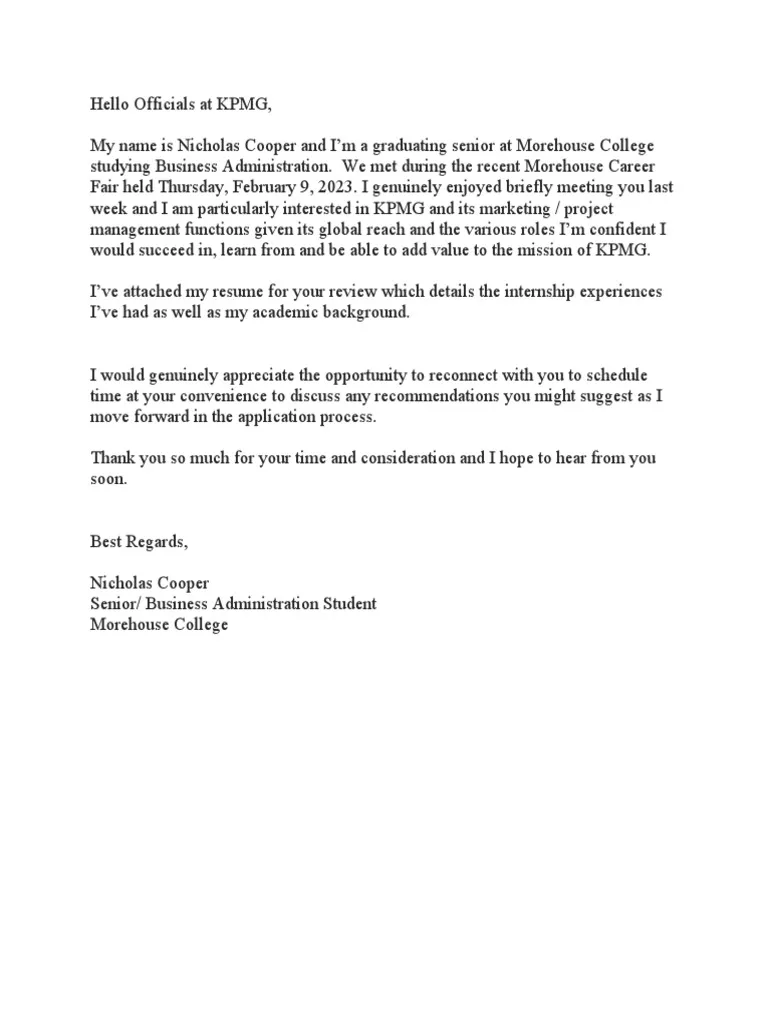Why a Strong KPMG Internship Cover Letter Matters
Your cover letter is your first introduction to KPMG, a chance to make a strong first impression and demonstrate why you’re the ideal candidate for their internship program. In a competitive field, a well-crafted cover letter can be the deciding factor, setting you apart from other applicants and showing you’ve taken the time to personalize your application. It allows you to elaborate on your resume, providing context to your experiences, highlighting your passion for the industry, and showcasing your understanding of KPMG’s values and goals. A compelling cover letter is more than just a formality; it’s your chance to convince the hiring manager that you’re not just qualified, but also a great fit for their team and culture. A weak cover letter, on the other hand, risks being overlooked, hindering your chances of securing an interview.
Researching KPMG and Tailoring Your Cover Letter
Before you begin writing, thoroughly research KPMG. Visit their website, explore their services, understand their industry focus, and identify their recent projects and initiatives. Look into the specific internship program you’re applying for and the roles within it. This research will enable you to tailor your cover letter to KPMG’s specific needs, demonstrating that you’ve taken the time to understand their organization. Use this information to highlight specific skills and experiences that align with their requirements. Address the hiring manager by name, if possible. Show that you’ve done your homework by referencing specific KPMG projects or values in your cover letter. This level of personalization demonstrates genuine interest and significantly increases your chances of getting noticed. Generic cover letters often fail, so customization is crucial.
Understanding KPMG’s Values and Culture
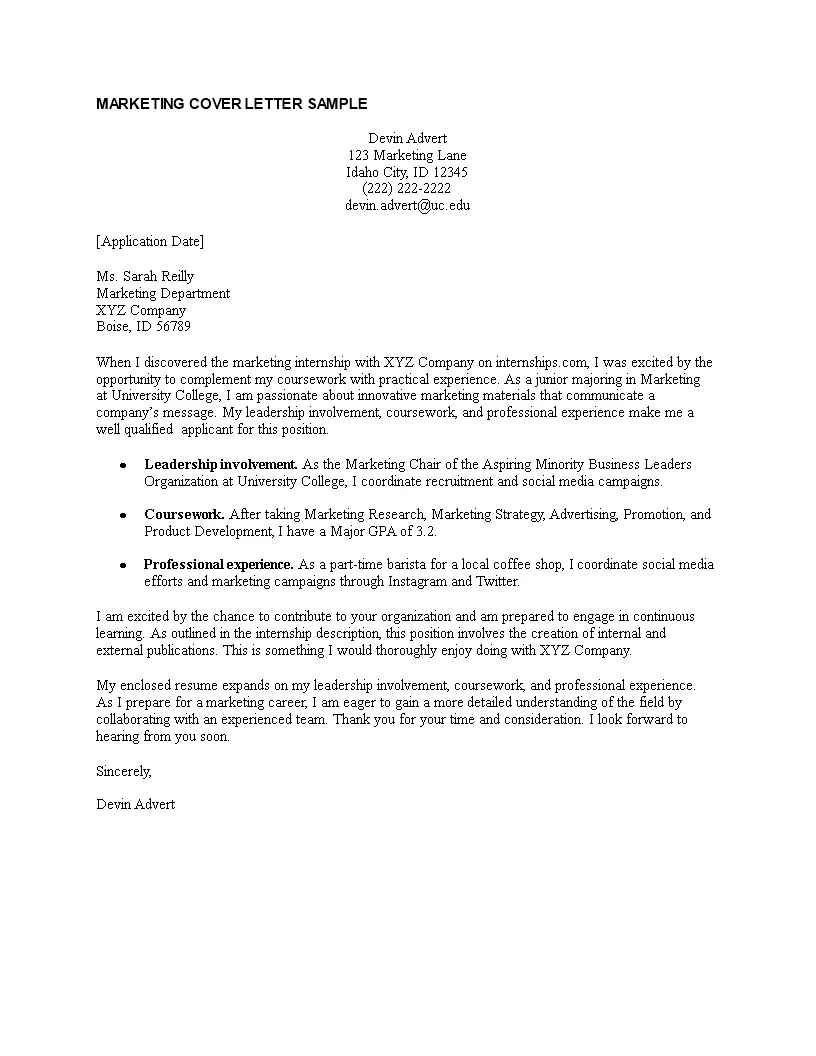
KPMG values are at the core of their business, and reflecting those values in your cover letter is key to impressing recruiters. Examine KPMG’s official website and materials to understand their core values. Common values include integrity, excellence, teamwork, and a commitment to making a difference. When writing your cover letter, weave in examples of how you embody these values. For instance, if teamwork is a core value, share an experience where you collaborated effectively with others to achieve a common goal. If integrity is highlighted, demonstrate how you’ve handled challenging situations ethically. By aligning your experiences and skills with KPMG’s values, you’re not just showcasing your qualifications; you’re demonstrating that you’re a good cultural fit for their organization. Be authentic in your presentation.
Highlighting Relevant Skills and Experiences
Focus on the skills and experiences that are most relevant to the KPMG internship you are applying for. Carefully review the job description and identify the key requirements. Common skills for KPMG internships may include analytical abilities, problem-solving, communication, leadership, and technical proficiency. When writing your cover letter, use specific examples to showcase these skills. For example, instead of simply stating that you have good analytical skills, describe a project where you analyzed data, identified key insights, and presented your findings. Provide quantifiable results whenever possible to demonstrate the impact of your skills. Use keywords from the job description, as they often indicate the specific qualities KPMG is seeking. Be clear, concise, and to the point, focusing on what you can bring to the role.
Showcasing Your Academic Achievements
Your academic record provides a foundation for your professional capabilities. Mention your major and any relevant coursework or specializations that align with the internship requirements. Highlight significant academic achievements, such as a high GPA, Dean’s List recognition, or relevant scholarships. If you participated in any projects or research relevant to the internship, provide a brief summary of your role and the results. Consider mentioning any academic awards, honors, or publications that demonstrate your dedication and expertise. For example, if you are applying for a finance internship, mention relevant coursework in financial accounting, corporate finance, or investment analysis. Use clear and concise language, avoiding unnecessary jargon. Show that you have a strong academic foundation to support your professional aspirations.
Quantifying Your Accomplishments
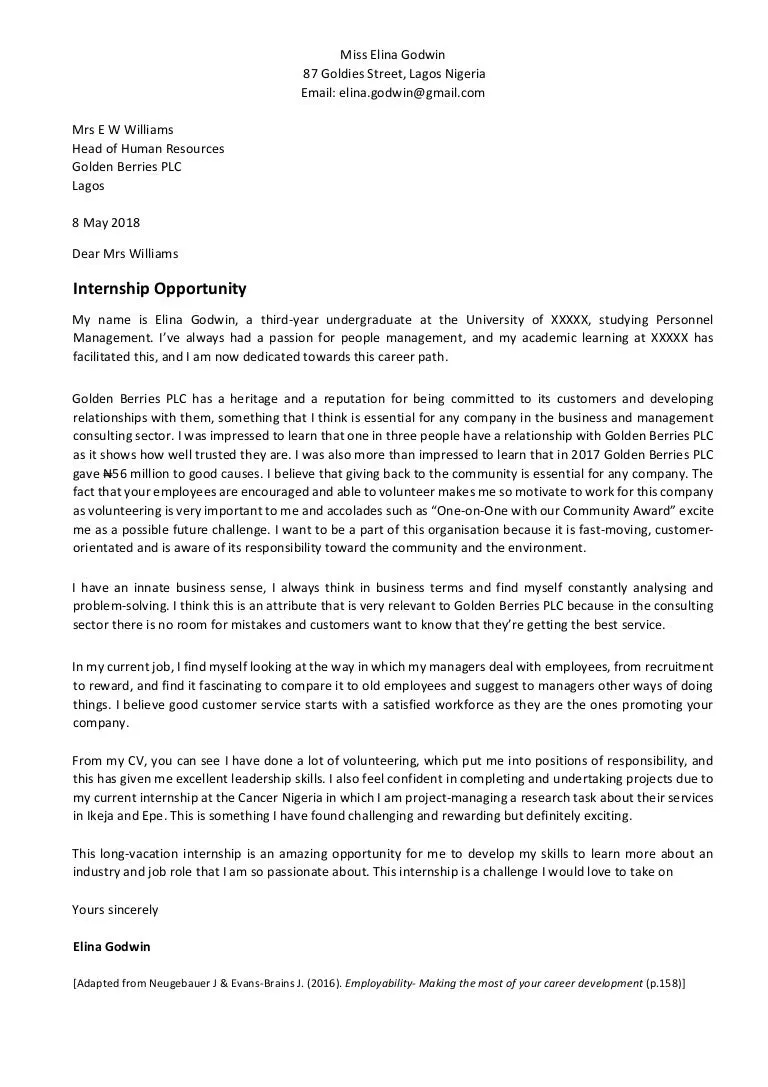
Whenever possible, quantify your accomplishments to demonstrate the impact of your skills and experiences. Instead of saying, ‘I improved customer service,’ say, ‘I improved customer satisfaction scores by 15% through the implementation of a new training program.’ Quantifiable results provide concrete evidence of your abilities. Use numbers, percentages, or specific metrics to showcase your achievements. For example, if you were involved in a project that saved the company money, state the exact amount saved. If you led a team, mention the size of the team and the results achieved under your leadership. Quantification adds credibility to your claims and allows the hiring manager to understand the scope and impact of your work. This approach helps you stand out by making your accomplishments more tangible and impressive.
Using Action Verbs to Impress
Use strong action verbs to describe your skills and experiences. Action verbs bring your accomplishments to life, making your cover letter more dynamic and engaging. Instead of saying ‘Responsible for,’ use verbs like ‘Managed,’ ‘Led,’ ‘Developed,’ ‘Implemented,’ ‘Analyzed,’ or ‘Created.’ Choose verbs that accurately reflect your actions and accomplishments. For instance, ‘Managed a team of five to complete a project within budget and ahead of schedule’ is more compelling than ‘Was responsible for managing a team.’ Using a variety of action verbs throughout your cover letter helps to showcase your range of skills and abilities. Avoid passive language and opt for active, results-oriented phrasing. Make your accomplishments sound impactful and memorable.
Structuring Your KPMG Internship Cover Letter
A well-structured cover letter is easy to read and conveys your message effectively. Start with a professional header that includes your contact information, the date, and the hiring manager’s name and title. Use a formal salutation, such as ‘Dear Mr./Ms. [Last Name].’ The body of your cover letter should consist of three to four concise paragraphs. The first paragraph should introduce yourself and state the position you are applying for. The subsequent paragraphs should highlight your relevant skills, experiences, and achievements, aligning them with the requirements of the internship. The final paragraph should express your enthusiasm for the opportunity and include a call to action, such as expressing your availability for an interview. Use clear and concise language throughout, and maintain a professional tone. Keep the formatting consistent, with standard fonts and margins.
The Ideal Cover Letter Length and Format
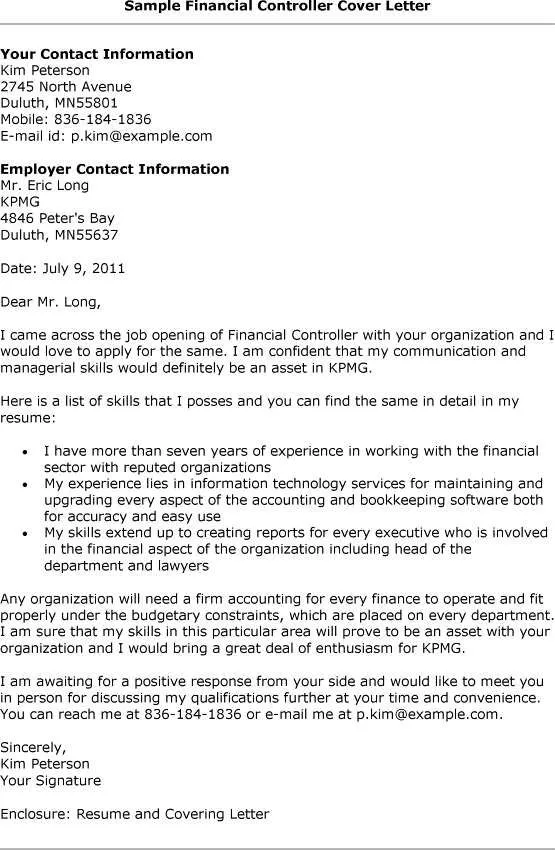
Keep your cover letter concise and to the point; aim for a single page in length. Recruiters often have limited time, so it’s important to make your message clear and impactful. Use a professional format with a standard font, such as Times New Roman or Arial, and a font size of 11 or 12 points. Use single-spacing with a blank line between paragraphs to improve readability. Maintain consistent margins of one inch on all sides. Avoid excessive formatting or unnecessary embellishments. The goal is to make your cover letter easy to read and visually appealing. Ensure that your cover letter is free of grammatical errors and typos. A well-formatted cover letter demonstrates your attention to detail and professionalism. Proofread it carefully.
Crafting a Compelling Opening Paragraph
Your opening paragraph is your opportunity to grab the reader’s attention and make a strong first impression. Start with a clear statement of your purpose: the position you are applying for and where you found the job posting. Immediately highlight your key qualifications and express your enthusiasm for the internship. Briefly mention what sparked your interest in KPMG and why you are excited about the opportunity. The opening paragraph should be engaging and tailored to the specific position. Avoid generic openings and instead, show that you have researched KPMG and understand their needs. For example, you could mention a specific KPMG initiative that aligns with your interests or skills. Make it clear why you’re a good fit and why the hiring manager should continue reading.
Developing Body Paragraphs That Resonate
The body paragraphs of your cover letter should provide specific examples to support your claims. Use the STAR method (Situation, Task, Action, Result) to structure your examples. Briefly describe the situation or project you were involved in, the task you were assigned, the actions you took, and the results you achieved. Focus on skills and experiences that align with the internship requirements, as outlined in the job description. Use quantifiable achievements to demonstrate the impact of your work. Highlight any relevant coursework, projects, or extracurricular activities. Keep each paragraph focused and concise, and ensure that they collectively tell a cohesive story about your qualifications and suitability for the role. Each paragraph should build upon the previous one, leading to a strong closing statement.
Writing a Strong Closing Statement
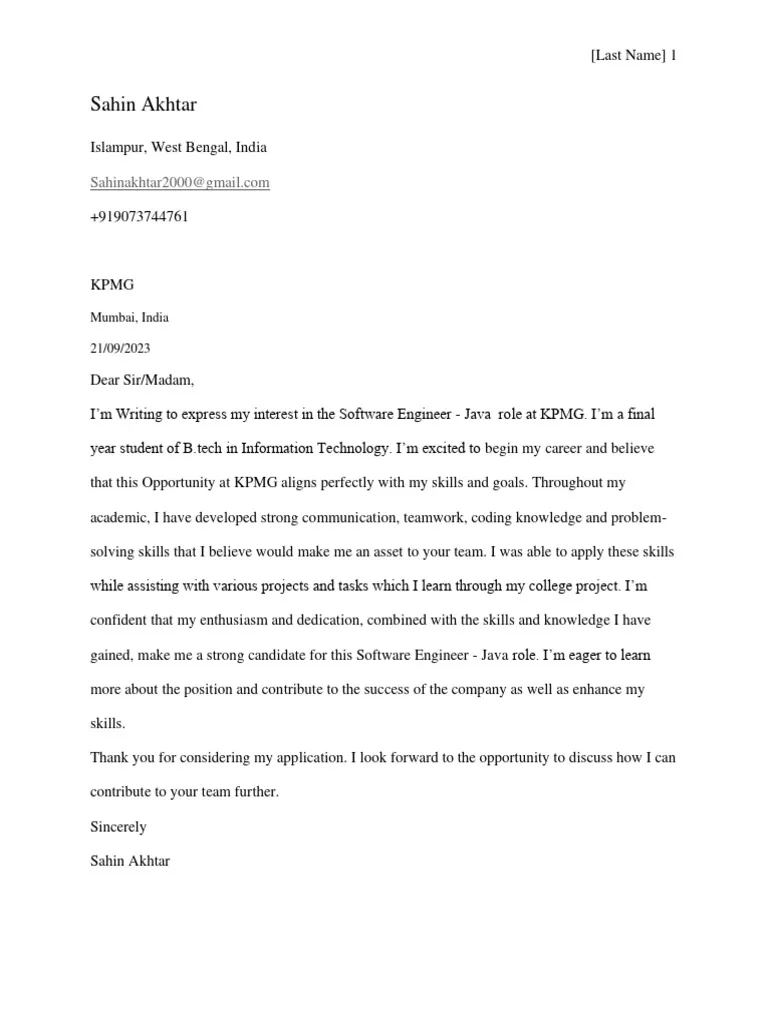
Your closing statement should reiterate your interest in the internship and summarize why you are a good fit. Reiterate your enthusiasm for the opportunity and restate your key qualifications. Express your confidence that you can make a positive contribution to KPMG. Include a call to action, such as stating your availability for an interview and how the recruiter can contact you. Keep the closing statement brief and professional, and thank the hiring manager for their time and consideration. End with a formal closing, such as ‘Sincerely’ or ‘Best regards,’ followed by your full name. Ensure that your contact information is readily available and easy to find.
Proofreading and Editing Your Cover Letter
Proofreading and editing are critical steps in ensuring your cover letter is polished and professional. Errors can detract from your qualifications and create a negative impression. Carefully review your cover letter for any grammatical errors, typos, or inconsistencies in formatting. Read your cover letter aloud to catch any awkward phrasing or unclear sentences. Ask a friend, family member, or career counselor to review your cover letter for feedback. They may catch mistakes you missed and offer suggestions for improvement. Ensure that your cover letter is free of jargon and clichés. A well-edited cover letter demonstrates your attention to detail and your commitment to excellence, both of which are important for making a great first impression with KPMG. It shows you care about the details and is professional.
Common Mistakes to Avoid in Your KPMG Cover Letter
Avoid common mistakes that can damage your chances of getting noticed. Do not submit a generic cover letter that is not tailored to KPMG or the specific internship. Avoid typos and grammatical errors; proofread carefully. Do not exceed one page in length. Avoid using jargon or overly complex language. Avoid including irrelevant information or exaggerating your qualifications. Do not make negative comments about previous employers or experiences. Avoid unprofessional language or a casual tone. Make sure your contact information is current and accurate. By avoiding these common pitfalls, you can create a cover letter that effectively showcases your qualifications and significantly improves your chances of landing an internship at KPMG.
Demonstrating Your Enthusiasm for the Role
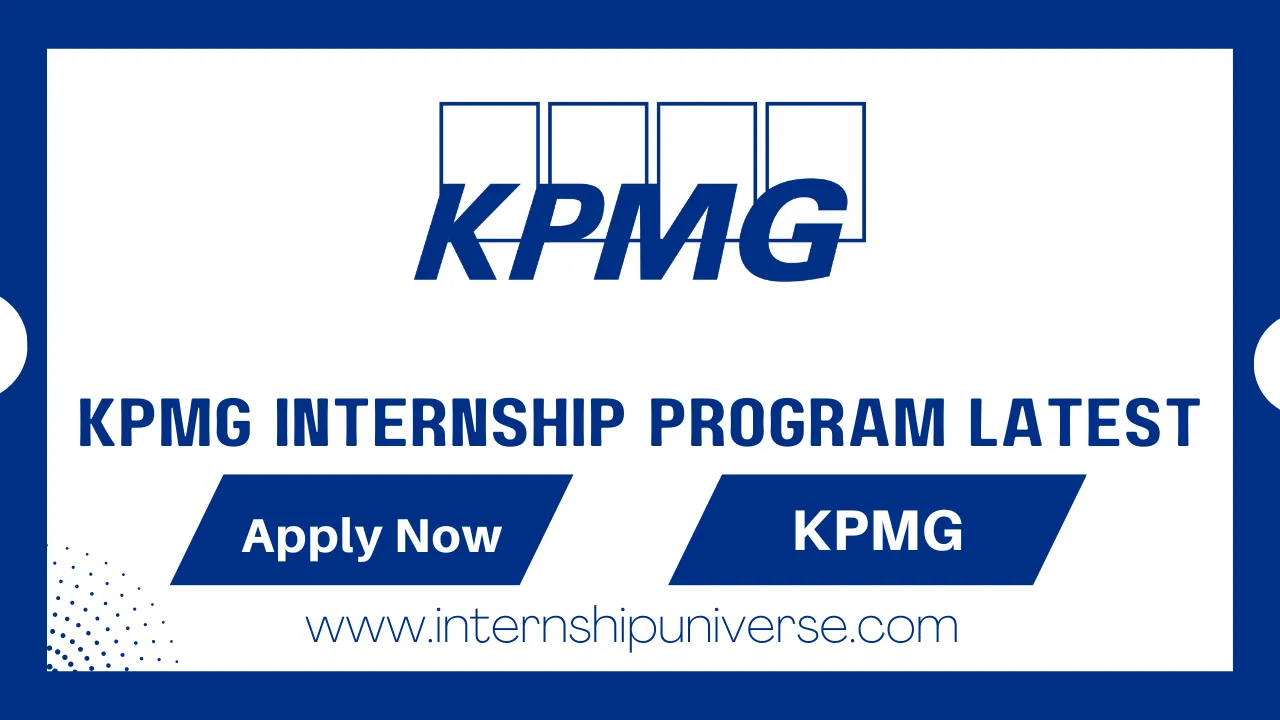
Show genuine enthusiasm for the internship and KPMG. Expressing your interest in the role, the company, and the industry is a great way to show you’re serious about the opportunity. Mention specific aspects of the internship that excite you. Highlight KPMG’s projects, values, or initiatives that resonate with you. Show that you understand what the internship entails and what you hope to gain from the experience. For example, you could mention a particular project KPMG is working on that aligns with your academic interests or career goals. Demonstrate that you have researched KPMG and understand its mission. This enthusiasm can set you apart from other applicants and demonstrates that you are invested in the position and company.
Including a Call to Action
Always include a clear call to action at the end of your cover letter. This tells the recruiter what you want them to do next. Invite the hiring manager to contact you to schedule an interview or discuss your qualifications further. Provide your contact information, including your phone number and email address. Reiterate your interest in the internship and thank the hiring manager for their time and consideration. By including a call to action, you make it easy for the recruiter to move forward with your application. A strong call to action encourages them to contact you, which increases your chances of getting an interview. Make it clear and concise, and ensure it’s professional and respectful.
